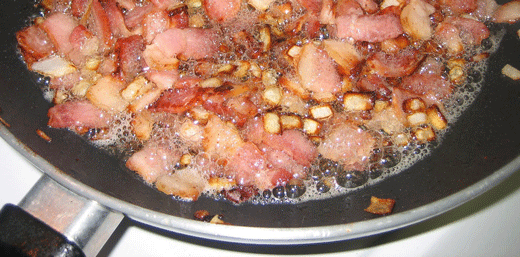Got Grease? (FOG)

Never pour grease down the drain, these waste products build up on your pipes and eventually restrict and or block the flow causing backups into your home.
The potential for Sanitary Sewer Spills to occur is greater when these waste products get into the wastewater conveyance system.
Wipe off grease and food scraps from plates, utensils, pots and pans prior to washing.
Up to 10 gallons of home generated cooking oil may be recycled at the Shoreway Material Recovery Facility located at 225 Shoreway Road in San Carlos (650.592.0255).
Most sewer backups happen because the line is plugged with an obstruction. However, backups can be caused by several factors including the condition of the sanitary sewer system itself, natural phenomena such as earth movement, heavy rainfall, and the incorrect usage of the system by the public.
Some common backup causes are:
- Solids / debris – Typical solids that buildup in the pipe and cause backups are dirt, hair, bones, feminine products, non-flushable wipes, paper towels, kitty litter, diapers, broken dishware, garbage, concrete, and debris.
- Fat/Oil/Grease (FOG) – When FOG is discharged into a sewer system they will solidify and, after a while, can build up and plug drain lines in your home, building, or complex. Solids and Debris can also plug the sewer lines owned by the District, thus increasing the maintenance cost to the District. Plugged sewers can also cause flooding of nearby private homes and businesses.
- Tree Root infiltration – Tree roots can cause backups. Roots can infiltrate the pipe system and block the wastewater flow.
- Water inflow/infiltration – Rainwater entering the public sewer line can cause system problems and overflows.
- Illegal connections-roof gutters and storm water runoff discharged to the sewer system by pumps or gravity take up system capacity which was designed for the transport of wastewater only.
- The discharging of swimming pool water to the sanitary sewer in excess of required flow rates to prevent overflow conditions and without a permit.
- Illegal dumping-accessing the system without permit or permission to dispose of waste not intended for the sanitary sewer system. This type of activity is against the law. If you witness this type of offense, obtain a description of the perpetrator and vehicle license and call the District at 650-321-0384.
- Structural defects in pipes and manholes – Significant sags, bellies in the line, cracks, holes, protruding laterals, misaligned pipe, offset and open joints and collapsing pipe material are all possible causes of backups.
Sewer capacity constraints are frequently caused by the improper disposal of materials, including fats, oils, and greases being introduced into the sewer system by District residents and businesses. After they enter the sewer system they will solidify and, after a while, can build up, plug drain lines in your home, building, or complex. FOG blockages can create sanitary sewer spills inside your home or business or overflow onto streets entering the storm drainage basins that lead to creeks and streams which flow to the San Francisco Bay.
Less than 10% percent of all sanitary sewer system problems /spills are caused by accumulations of fats, oils and greases discharged to it from the preparation and serving of food. This is mostly due to proactive Fats, Oil & Grease program the District employs to work with restaurants and businesses to keep grease traps clean and encourage the recycling of grease and oils rather than disposing of them in the sewer system.
Fats, oil and grease can come from many sources. In the food industry, ‘grease’ often refers to fats and oils derived from animal and vegetable sources. These include meats, nuts, cereals, beans and waxes/paraffin. You can help reduce fats, oils and grease from accumulating in the pipelines by recycling or disposing of your grease rather than pouring it down the drain.
Do not pour yellow grease down the drain or in the trash. It is best to compost small amounts of cooking/fryer oil (in a paper milk or ice cream carton). Large amounts of cooking/fryer oil should be collected in a separate recycling bin or container setup either inside or outside the building and hauled through a licensed grease hauler. Large amounts of used oil, up to 10 gallons, can also be transported by the food facilities in their own vehicles to Allied Waste Industries located at 225 Shoreway Road, San Carlos, for additional information please call 650-637-1411.
